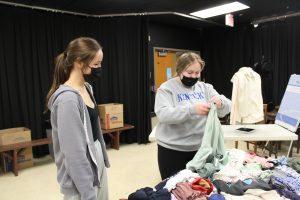
The Environmental Club hosted a clothing exchange throughout the school day Thursday, Feb. 24 and Friday, Feb. 25 in the Dargusch Black Box Theater.
Science teacher and Environmental Club adviser Scott Logsdon said this is the project the Environmental Club decided to do for the Columbus Zoo’s annual Teen Eco Summit event.
The Teen Eco Summit is a collective group of 16 central Ohio schools that come together to plan specific projects for their own schools that would be beneficial to the environment, Logsdon explained.
“Last year for our project, we made recyclable water bottles out of 100% repurposed materials, but it didn’t work out that well,” he said.
Eco Summit member and sophomore Iris Frost explained that for each item of clothing someone donates, they could pick out that same number of clothing that others have donated, and all extra items were only $1. Students received paper slips showing the amount of clothing they brought in, which made them eligible to pick up the same number of clothing for free, Frost said.
Most clothes end up in a landfill rather than being donated or recycled, which negatively impacts the environment, Logsdon explained.
“You have the dying process, the fiber process, the shipping process, all of the things that contribute to the harmful cycle of fast fashion,” he said. “If you don’t need it, don’t buy it.”
Eco Summit member and sophomore Campbell Moore said the fashion industry is the second largest polluter following the oil industry due to water contamination, microfiber pollution and waste issues.
“Every time we wash a synthetic garment such as polyester or nylon, about 700 individual microfibers are released into the water, which make their way into oceans,” Moore said. “Scientists have discovered that small aquatic organisms ingest those microfibers which are then eaten by small fish which are later eaten by bigger fish, introducing plastic in our food chain.”
Frost said the intent of the clothing drive was to promote sustainability in fashion and buying secondhand clothing rather than clothing from fast fashion companies.
“As we go into a more modern age, there are faster trends known as micro trends,” Frost said. “The more micro trends there are, the more fast fashion can profit because they produce the clothing at a faster rate, and when those trends die, that clothing will mostly be discarded and wasted.”
Frost said she supported the idea of a clothing swap when she heard of it at the Teen Eco Summit because it relates to her passion of thrifting and sustainability.
“[Thrifting] is very satisfying as a student who has a budget and doesn’t want to spend all my money on clothes, so secondhand shops and thrift stores are my way to go,” she said. “I love that I can do something I love with a club that I love.”
Fundraising chairperson and sophomore Kendall Moore said that the leftover clothing will be donated to the United Methodist Free Store, which provides free, used clothing and household items to individuals and families.
In order to ensure the donated clothes go directly to people in need, the Environmental Club chose not to give to Goodwill, which is more popular with teenagers who thrift for fun, Moore explained.
The harmful effects of fast fashion are not talked about enough, she said, so ideally this event can raise awareness and open people’s eyes to an alternate form of shopping.
“We want people to understand the big idea of the clothing swap,” Moore said. “It’s not just about donating clothes, it’s also about helping those in need and how environmentally unfriendly fast fashion is.”














